Bureaucratic Tasks are still the top cause 61% of physician burnout and is not getting better with all the automation and the promise of AI
December 13, 2023
In the recent 2023 Medscape survey: 9,100 physicians from 29 different specialties were surveyed. The unfortunate part is that things got worse, not better compared to the 2021 survey showing that burnout and depression continue to be a challenge for physicians even post COVID-19 pandemic.
6 Takeaways from the Physician Burnout & Suicide Report
Here are 6 key takeaways from the survey and our suggested strategies as physician leadership coaches and training professionals to address the ongoing pandemic in the healthcare industry.
1. Physician Burnout Is Higher Than Before and During the Pandemic
53% of physicians are burned out and 23% are depressed. Compared to 2018 where in 2018, 42% reported burnout and only 15% reported depression.
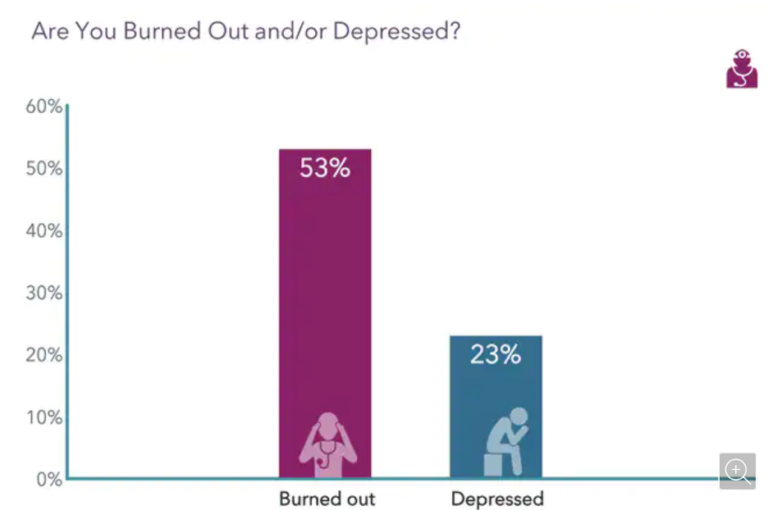
Source: Medscape Burnout Survey 2023
2. Emergency Medicine and Primary Care physicians report the highest level of burnout
In the 2023 survey, Emergency Medicine, Internal Medicine, and Pediatrics (primary care) physicians reported the highest levels of burnout. This is a significant change from the 2021 survey in which critical care was reporting the highest level of burnout.
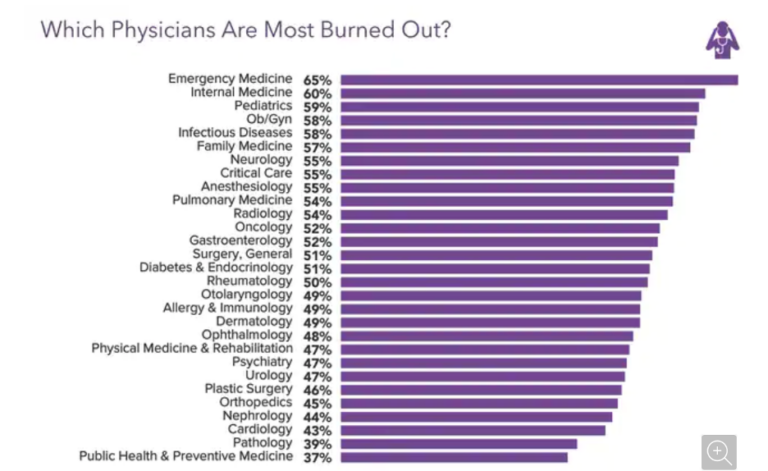
Source: Medscape Burnout Survey 2023
3. Female physicians still experience more burnout than Male
Over the years, women reported more burnout than their male counterparts as they tend to assume more responsibilities at home and work. Unfortunately, in recent years, this has increased and not decreased.
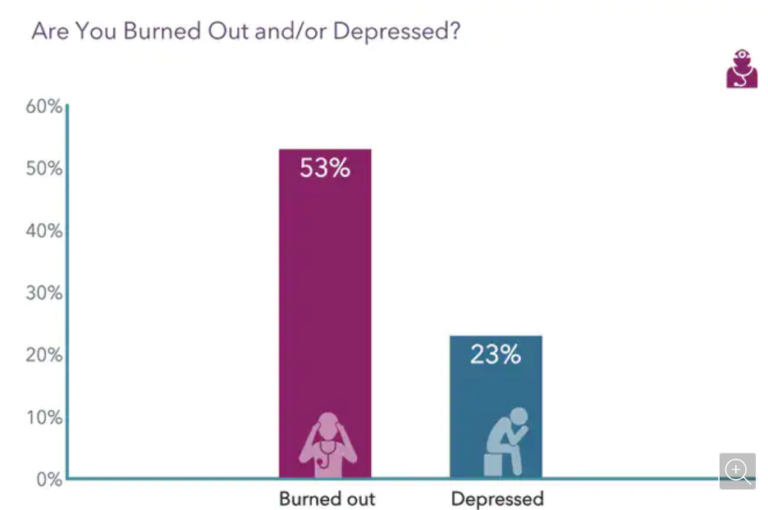
Source: Medscape Burnout Survey 2023
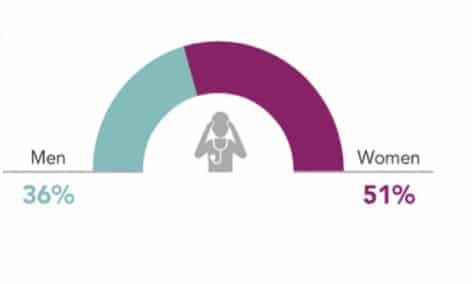
Source: Medscape Burnout Survey 2021
4. Pervasive and Persistent
We have been reporting that stress and exhaustion leading to burnout have been in existence within the medical community way before COVID and advocating for making clinician experience as important as patient experience.
Almost two third of the respondents reported that they have been feeling burned out for more than 13 months or longer.
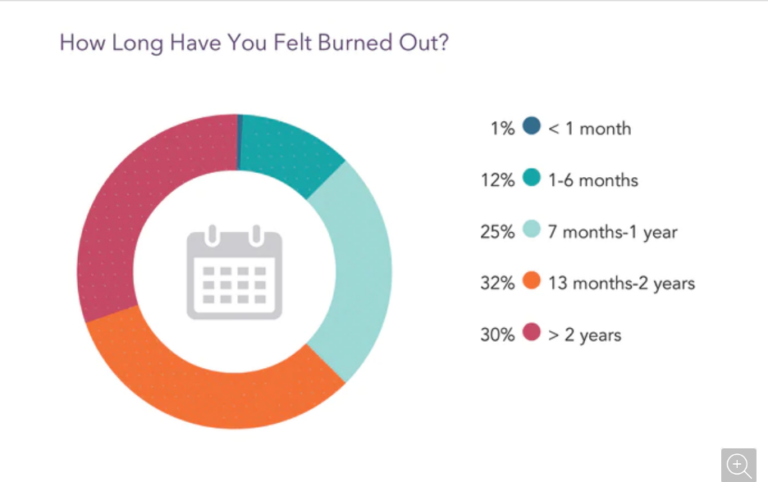
Source: Medscape Burnout Survey 2023
5. Bureaucratic Tasks are still the top cause 61% of burnout and is not getting better with all the automation and the promise of AI
EHR documentation continues to be a source stress and burnout on physicians. On average, physicians spent 1.84 hours a day on documentation according the JAMA internal medicine report article. That adds up to 9.2 hours a week. A simple and cost effective solution is to have a Virtual Assistant.
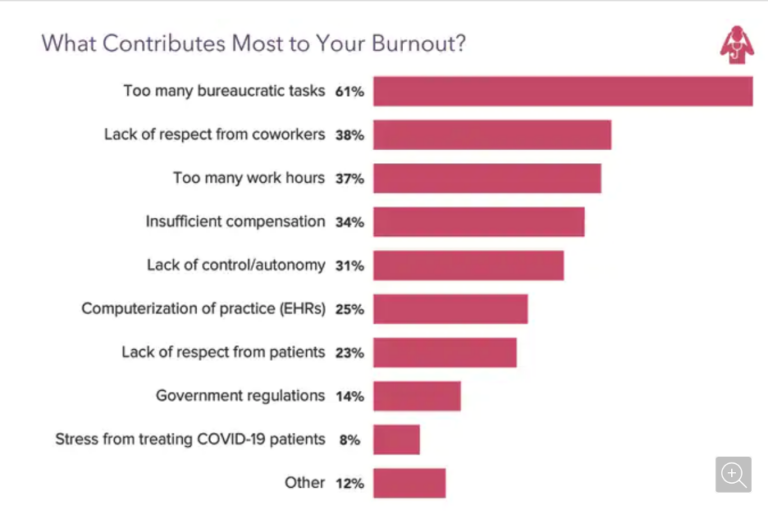
Source: Medscape Burnout Survey 2023
In 2016 Medscape, too many bureaucratic tasks and spending too many hours at work were the top 2 causes of burnout:
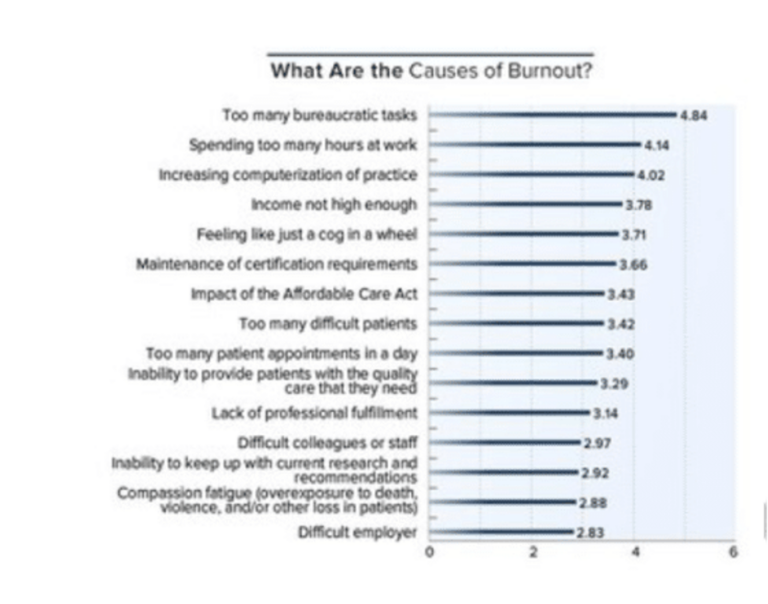
Source: Medscape Burnout Survey 2021
6. Severity of the burnout and impact on physician life
Almost two third of the respondents said that burnout had a severe impact on their life.
Source: Medscape Burnout Survey 2023
Solo practices are less burned out than larger groups and hospital based physicians.
Solo practices report less burnout as they feel they have more autonomy (61%) and more control over their productivity (38%).
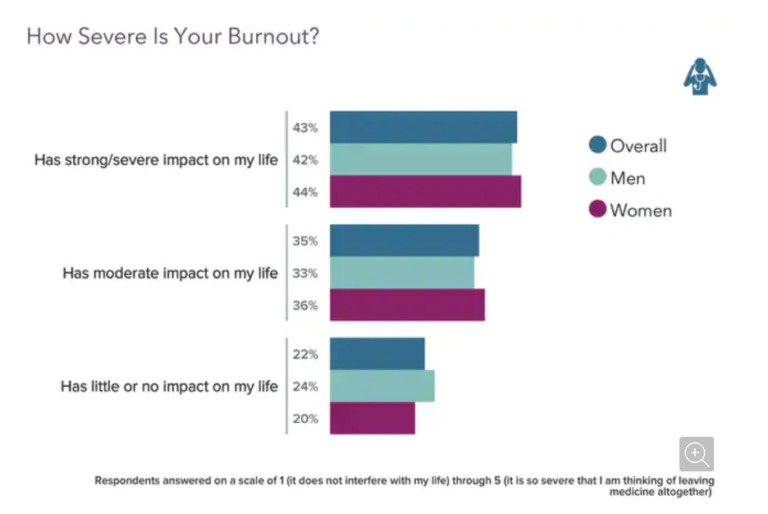
Source: Medscape Burnout Survey 2023
How to Help Solve Physician Burnout
Albert Einstein once said: “the definition of insanity is to continue to do the same things and expect a different outcome.”
I have great concerns that we still prescribe self-care as the cure for burnout. We’ve put the burden of solving the problem squarely on the shoulders of the clinicians. Recommendations for more yoga, mindfulness, meditation, and exercise are typically what the response has been. But those are tools for improving well-being and not preventing burnout. What is needed are upstream strategies that address the roots of the causes, not downstream tactics that address only the symptoms.
- Focus on Clinician Experience as Being Equal to Patient Experience
While the focus by organizations and leaders has been on patient experience, we all know that you can’t give what you don’t have. Clinicians can’t achieve a high level of patient satisfaction when they are running out of capacity, lack work life balance and are stressed, depressed and suffering from burnout.
Shift the formula: Patient Experience = Clinician Experience – Hassle Factors
- Assess and Address the Hassle Factor Index
Using a hassle factor index survey to help your nurses and physicians identify the hassle factors that are in their way causing them stress, frustration and extra work. The number 1 hassle factor continues to be documentation in the Electronic Medical Record and bureaucratic tasks.
- Virtual Assistants
The best solution to help reduce the bureaucratic tasks and spending many hours at work (the top 2 causes of burnout in the survey), is to hire a virtual assistant to take care of all documentation and bureaucratic tasks so physicians can spend more time at home. For a small fee/day, you can have a virtual assistant full time working for you. Here a link to free trial for a virtual assistant tool.
- Coaching
There is more evidence than ever that professional healthcare coaching helps reduce burnout. In the JAMA Internal Medicine, Research conducted at the Mayo Clinic showed that professional coaching of physicians is a potentially effective intervention to improve physician well-being. The authors report that physicians who completed six private sessions with a professional coach showed significant decreases in emotional exhaustion and overall burnout, in addition to increases in quality of life and resilience. These results offer hope for physicians.
From our own experience at HLI, coaching physicians and nurses has reduced the level of stress and mental strains. For free coaching consultation, contact us online.
- Reduce workload/Create Not to Do list
Let’s stop the madness! Let’s stop saying “do more with less” and start doing less. During these stressful times, less is more. This is the time to develop a “Not To Do List” by challenging the need for many projects, many metrics, many meetings and due dates.
- Invest and Improve Frontline Clinical Leadership
Empathetic Leadership is now more critical than ever. We need clinical leaders that would empathize with their stressed-out team members. Being empathetic starts with the leader acknowledging that things are not the same as before, listening well to their team members and taking actions to address hassle factors or sometimes just simply listening without the need to take any actions. Leaders need to create a psychological safety for people to say I am not ok. Leadership is crucial during times of crisis. We have had the privilege to be on coaching calls with healthcare leaders and physicians during times of crisis and are always humbled by their compassion and dedication. Download a complimentary HLI whitepaper in which we identify the 3 most important tools leaders can use during a crisis and provide guidance on how best to apply them with your team.
- Provide Wellbeing Resources to Your Clinicians
Here are some free resources that you can share with your clinicians:
- Burnout Assessment – HLI provides a free burnout assessment tool that can help you determine if you are headed down the burnout path. Upon completing the survey, you will receive a score that will help you determine where you fall on the burnout spectrum.
- Resources to restore personal energy: During a prolonged crisis, it feels like everything desirable is in short supply. That is especially true when it comes to the resources we rely on to restore our personal energy. Our best option, in this case, is to focus on maximizing the opportunities that we have easily made available for personal restoration in times of prolonged energy drain. Here are 2 vital steps for restoring your energy during a crisis.
- Webinar on Resilience under Pressure: A free webinar is offered by HLI on resilience under pressure. Challenging times can easily make us feel as though we have no control over our commitments to care for others and no time to care for ourselves. This webinar includes some viable practices for physicians to restore their energy in the midst of a busy schedule, with little intrusion and big benefits.
- The Harvard Business Review published an article on the main causes of burnout, how we got to this point, providing additional suggestions on how to beat burnout.
Given we all entrust our family’s health and lives to our physicians all the time, let’s do everything we can to support those physicians and to take care of them first, so they can take good care of our families and loved ones when we need them.
Contact us for more information on virtual assistant service, free trial, coaching, resilience and well-being services for you or your team

Recent Comments